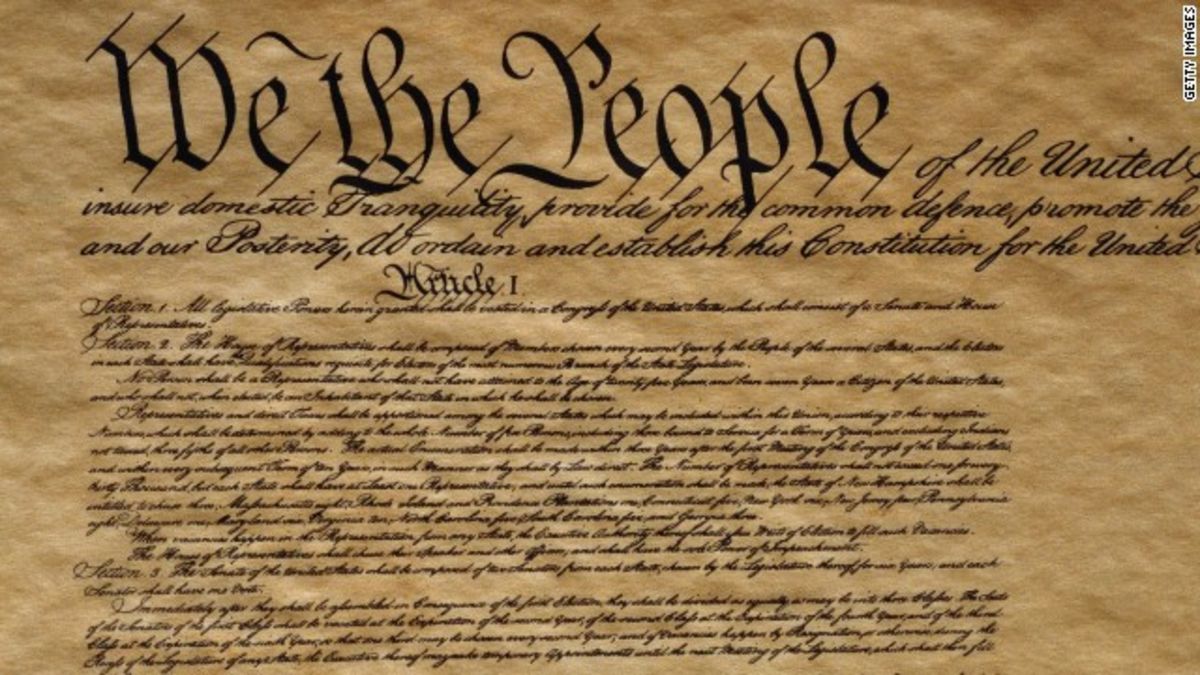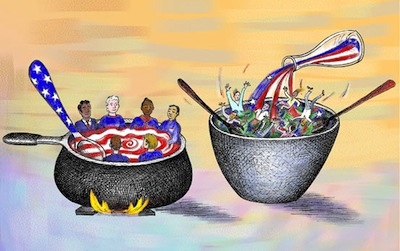Come here, my son. I'm going to tell you a story.
?
Yes, it is going to take a while.
?
No, put - put your phone down. Just listen.
So you know how you go down our street and you go past the farm on your left that sells ice cream and those chocolate-dipped Oreos you like? Then you go past that open field on the right that eventually leads to a tree-covered hill. Well, on top of that hill and behind those trees, there are three houses, all in a row. The first house you come across, as you travel down that lonely, backcountry road, is owned by a Richard Adams.
At Mr. Adams' house, you'll see a big sloping hill in the front yard before the grass disappears into that thicket of maple trees. When your Nana was young, she went to a birthday party there for Mr. Adams' son, Bobby. It was in the winter and the kids would sled down that big hill. When they got to the bottom, Mr. Adams would be waiting on his snowmobile with a rope tied to the back and he would use that rope to pull Nana and her friends up to the top of the hill again.
!
Yeah, it was pretty cool.
When my dad was young - when Papa was young - town sports were different. You weren't grouped together randomly. You were paired with the kids in your neighborhood. So Papa lived in the Plains; you remember where my grandma's house was, right? Yeah, so that neighborhood. Papa played with all the kids who lived there. Where Mr. Adams lived, that would be considered the Falls. So Bobby and David went to school with Nana and played on the Falls sports teams, which Papa said always had the best teams.
So anyway, Mr. Adams owned all that land and he gave some of the property to his sons, Bobby and David. When they grew up, they built their homes on that land. Those would be the next two homes down that road. If you squint hard when driving by you and see them through the trees.
David got married and had three kids; Bobby had two. Bobby's oldest son was named Rob, who was in my grade. He lived in the next house after Mr. Adams'.
So you know how if you follow that road next to our house it takes you to that golf course? One summer I worked there with Rob, cutting grass. But that's not what I want to tell you about Rob. What I want to tell you about Rob is a story from the third grade.
?
Because the background is important, all right? Now just listen.
So in third grade all the students in all the classes had to write a short autobiography. Then, the teachers took the writings and published them in a little booklet and everyone got one of the booklets to take home. It was the first time you got to read the works of students in the other classes.
Anyway, I'm reading through it and I get to Rob's class. I can't remember the teacher's name, but I read Rob's autobiography and I learn that he is the descendent of John Adams. Yes, that John Adams. And, of course, John Quincy Adams too.
Now, up to that point, the president's were just a bunch of names I was vaguely aware of because Nana bought your uncle and I these placemats that had all the presidents and their pictures on them. But now, for the first time, one of those pictures meant something. It felt real. I felt I had a connection to our country, our town, and my classmate. John Adams was just the second president, but now his story was Rob's story. And now that I shared a school and a town with Rob, it became my story.
Rob had a cousin, Dan, the son of David, who grew up right next to him, the last house on that stretch of road. I still see Dan when I play basketball sometimes. He lives in town now has two kids that you share a school with. I'm telling you all this because now this is your story too.
Now, when you learn about history in high school, you're probably not going to learn much about John Adams, or his son for that matter. But there are some things you should know about him.
First, he was one of the only few Founding Fathers who did not own slaves. It's easy to say slavery is bad now; he actually said so at a time when it was popular. I tell you this because the history you are going to learn is different from what I was taught. There is more of a focus now on all the bad things our country did. And learning about it is going to make you feel bad. And you're going to wonder if we're the bad guys.
You're going to search for redeeming qualities in our founders and discover many troublesome and problematic things. You're going to feel the heavy weight of genocide, chattel slavery, Jim Crow, foreign invasions, internment camps, police chokeholds, and housing discrimination. You're going to want to cry. You're going to feel angry. You're going to want to fight something, even if you don't know what that something is. You're going to want to tear down everything with any tie to our evil past, even if you don't know what to replace it with.
But eventually you'll grow weary. It's exhausting being mad all the time. You'll focus on the few things you can improve; your family, your community, your health and spiritual well being. You'll learn to let go of all the things that only bring you frustration. And you'll want to take another look into our past and see if there was anything worth believing in.
It is then that you'll discover John Adams.
But there is more to him.
You'll learn about something called the Boston Massacre: A group of British soldiers shot several Massachusetts citizens.
?
Well, we were still a part of Britain at the time. It's complicated. I don't want to spoil it for you. Just know that the people of Massachusetts hated the British and things were really tense during this period.
So anyway, the British soldiers kill a bunch of people but it's not clear who instigated the whole thing. The British seek out John Adams, who was a lawyer, to represent them in court. Now, he's conflicted. He doesn't think much of the British himself and he wants America to be free and autonomous.
He believes that the soldiers were provoked and knows that if he doesn't help them, they won't get a fair trial. So he has an incentive to let them lose. If he helps them, everyone in Boston will hate him for siding with Britain. So he has a disincentive to help as well.
But, as a lawyer, he believes in laws and rules and blind justice. You see, John Adams wants to build something new in America. But he wanted it built on moral grounds. And that meant standing on the side of justice, even when that means helping his enemies. If he couldn't do that, he didn't feel he had any right building a better America.
So he defended the British soldiers in court and they were found not guilty. What he did was brave. It's not enough to stand up for justice when it's convenient for you and your friends. Bravery is standing up for justice knowing that the people who see you as "on their side" are going to hate you for it. Bravery is risking social isolation for doing what's right.
?
How do I know so much? There is a 6 part series about John Adams on HBO. You can binge it in one weekend.
Now, because John had these beliefs, he didn't have a lot of friends. He started off cordial with Thomas Jefferson, but they soon became enemies. They had opposing views of war, freedom, and the size of government. Jefferson was also the owner of many slaves.
Now I want to tell you another story.
?
No, not about Jefferson. About a boy your age who lives in Virginia. Right now, his father is telling him about a classmate who is the descendent of Thomas Jefferson. The boy is learning about Monticello, a historical landmark just a few miles down the road. This is Jefferson's mansion. The boy is going to visit Monticello and be amazed when he learns about the genius of Jefferson. He's going to read the words Jefferson authored, the Declaration of Independence, and be inspired by his writings on the spirit of freedom. The fact that Monticello was built by slaves will not be stressed to this boy, just a footnote in the long history of Jefferson's amazing accomplishments that created the prosperous society we enjoy today.
If it seems logical to find identity and inspiration in John Adams, based mostly on where you are born, know that it will seem logical for someone to find identity and inspiration in Jefferson, Adams' enemy.
In my lifetime there have been two elections in which the person with the most votes did not win. You can blame that on the electoral college, which is just a way of saying you can blame that on John Adams. Adams wanted a strong central government because he didn't totally trust the will of the people. I'll never agree with that, but I like the guy because, in him, I see a part of myself. I see him whenever I think of Rob, Nana and Papa, our road with the farm that sells ice cream and the chocolate-dipped oreos you like, the golf course behind our house where Rob and I used to cut the grass, or the row of Adams' houses I pass on my bike ride. And now, I see him in you. So I excuse it.
As such, that boy in Virginia can excuse Jefferson's view that blacks were a lesser race because Jefferson has become a part of his identity.
?
The point? I'm not saying that there are no wrong ideas or beliefs. I'm just saying that trying to understand people is really really hard. But I still expect you to do it. The more you understand people not like you, like the boy from Virginia, the less you'll jump to hate. The less you hate, the happier you'll be.
?
Oh, make no mistake. Trying to empathize with your enemies, or even trying to walk away from the fight, will put a mark on your back. You'll get called out for your privilege. You'll get called out for your complicity.
Justice is important. But, if at least once in a while, you don't see that your enemies are being treated unjustly, or you fail to call out your side for being unjust, you're probably less concerned with justice than with being liked. That is not the country John Adams wanted to create for us. If, at least some of the time, justice doesn't make you unpopular among your family, friends, and community, then you're probably doing it wrong.
This country has a long and messy history, but at some point you have to accept it as part of your identity. Ground that identity in one single person you can believe in. Find your John Adams. Maybe it's Frederick Douglass. Maybe it's Elizabeth Cady Stanton. Maybe it's Donald Trump (please no). Find one person and say, "this is what it means to be an American." You have my permission to ignore the rest.
Look, I haven't figured out this shitstorm yet and you probably never will either. Just try to look for the best in people. It's tiring work, but not nearly as tiring as being angry all the time. Even John Adams and Thomas Jefferson became friends again before they died. Some of it was due to the exhaustion of bickering and some of it was due to adapting charitable attitudes and focusing on the universal human experience.
Have you been on your phone this whole time? Did you hear anything I said? Nothing! Forget it. Here's the tl;dr version: the descendants of John Adams live in our town and go to your school. Our country's history involves a lot of people who did or believed in terrible things, but some of them were kinda awesome. Find something to be proud of and make that the basis of your identity.
Just watch the John Adams series, okay? It's really good.




